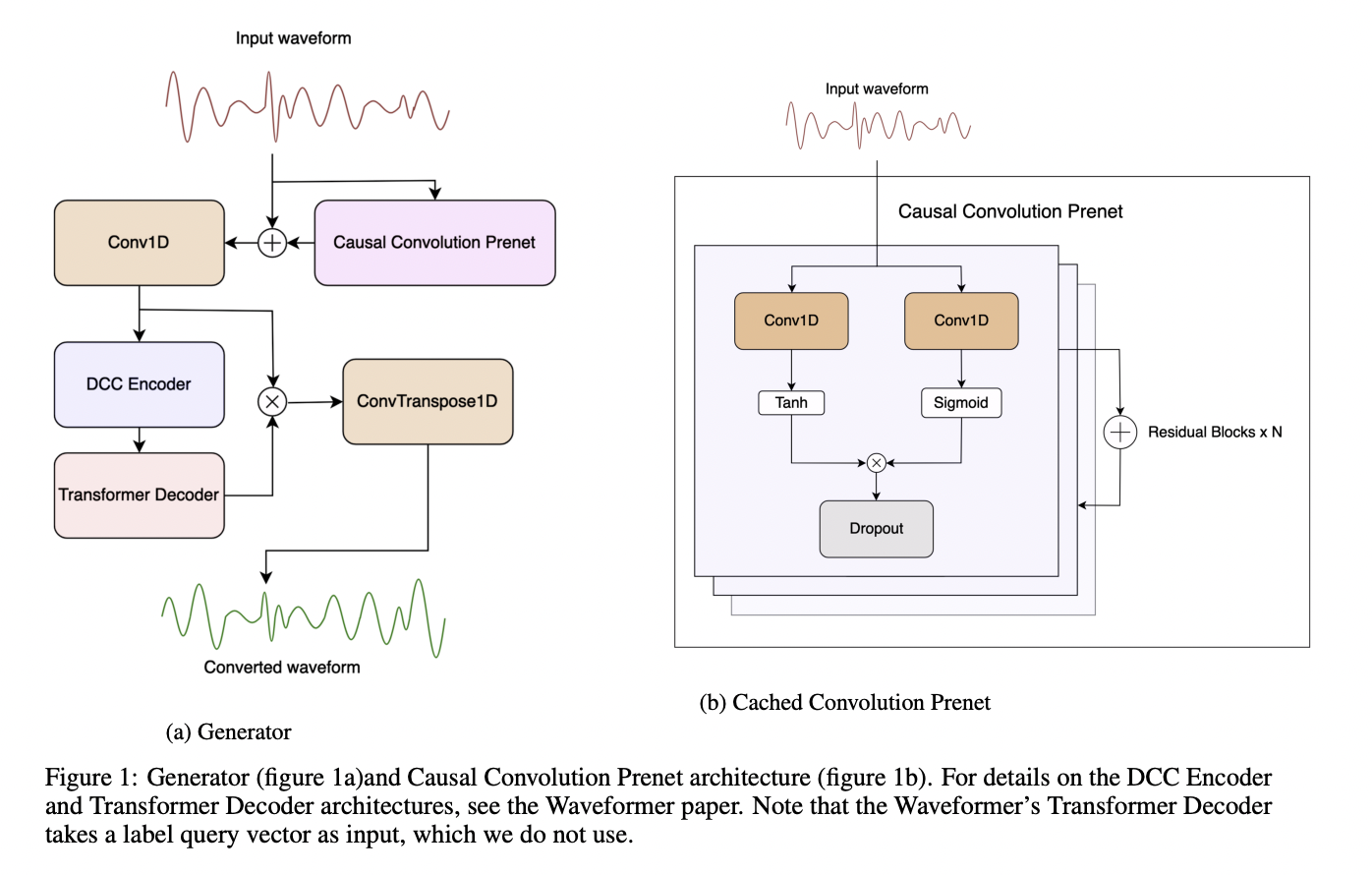Koe AI Unveils LLVC: A Groundbreaking Real-Time Voice Conversion Model with Unparalleled Efficiency and Speed

[ad_1]
A team of researchers from Koe AI introduced LLVC (Low-latency, Low-resource Voice Conversion), a model designed for real-time any-to-one voice conversion, characterized by ultra-low latency and minimal resource consumption. It operates efficiently at a remarkable speed on a standard consumer CPU. The study generously offers access to LLVC’s open-source samples, code, and pre-trained model weights for broader accessibility.
LLVC model consists of a generator and a discriminator, with only the generator used during inference. The evaluation utilizes LibriSpeech test-clean data and employs Mean Opinion Scores from Amazon Mechanical Turk for assessing naturalness and target-speaker similarity. Knowledge distillation, involving a larger teacher model guiding a smaller student model for improved computational efficiency, is also discussed.
Voice conversion involves transforming speech to match another speaker’s style while retaining the original content and intonation. Achieving real-time voice conversion, with faster-than-real-time operation, low latency, and limited access to future audio context, is a demanding task. Existing high-quality speech synthesis networks need to be more suitable for these challenges. LLVC, rooted in the Waveformer architecture, is designed to tackle the unique demands of real-time voice conversion.
LLVC employs a generative adversarial structure and knowledge distillation to attain remarkable efficiency, characterized by low latency and resource utilization. It integrates the DCC Encoder and Transformer Decoder architectures with some customized modifications. LLVC is trained on a parallel dataset where diverse speakers’ voices are transformed to mimic a specific target speaker, with the central aim of reducing perceptible differences between the model’s output and the synthetic target speech.
LLVC impressively achieves sub-20ms latency at a 16kHz bitrate, surpassing real-time processing by nearly 2.8 times on consumer-grade CPUs. It sets a benchmark by boasting the lowest resource consumption and latency among open-source voice conversion models. To assess its quality and self-similarity, the model’s performance is evaluated using N-second clips from LibriSpeech test-clean files. In comparison, LLVC competes with No-F0 RVC and QuickVC, both selected for their minimal CPU inference latency.
The study focuses solely on real-time any-to-one voice conversion on CPUs, neglecting exploration of the model’s performance on diverse hardware or comparisons with existing models on varying configurations. Evaluation is restricted to latency and resource usage, lacking an analysis of speech quality and naturalness. The absence of detailed hyperparameter analysis hampers replicability and fine-tuning for specific needs. The study overlooks discussion of LLVC’s real-world challenges, including scalability, OS compatibility, and linguistic or accent-related issues.
In conclusion, the research establishes the viability of low-latency, resource-efficient voice conversion through LLVC, a model that operates in real-time on everyday consumer CPUs, eliminating the need for dedicated GPUs. LLVC finds practical application in speech synthesis, voice anonymization, and vocal identity alteration. Its use of a generative adversarial architecture and knowledge distillation sets a new standard for open-source voice conversion models, prioritizing efficiency. LLVC offers the potential for personalized voice conversion by fine-tuning single-input speaker data. Expanding the training data to encompass multi-lingual and noisy speech could enhance the model’s adaptability to various speakers.
Check out the Paper and Github. All credit for this research goes to the researchers of this project. Also, don’t forget to join our 32k+ ML SubReddit, 41k+ Facebook Community, Discord Channel, and Email Newsletter, where we share the latest AI research news, cool AI projects, and more.
If you like our work, you will love our newsletter..
We are also on Telegram and WhatsApp.
![]()
Sana Hassan, a consulting intern at Marktechpost and dual-degree student at IIT Madras, is passionate about applying technology and AI to address real-world challenges. With a keen interest in solving practical problems, he brings a fresh perspective to the intersection of AI and real-life solutions.
[ad_2]
Source link
